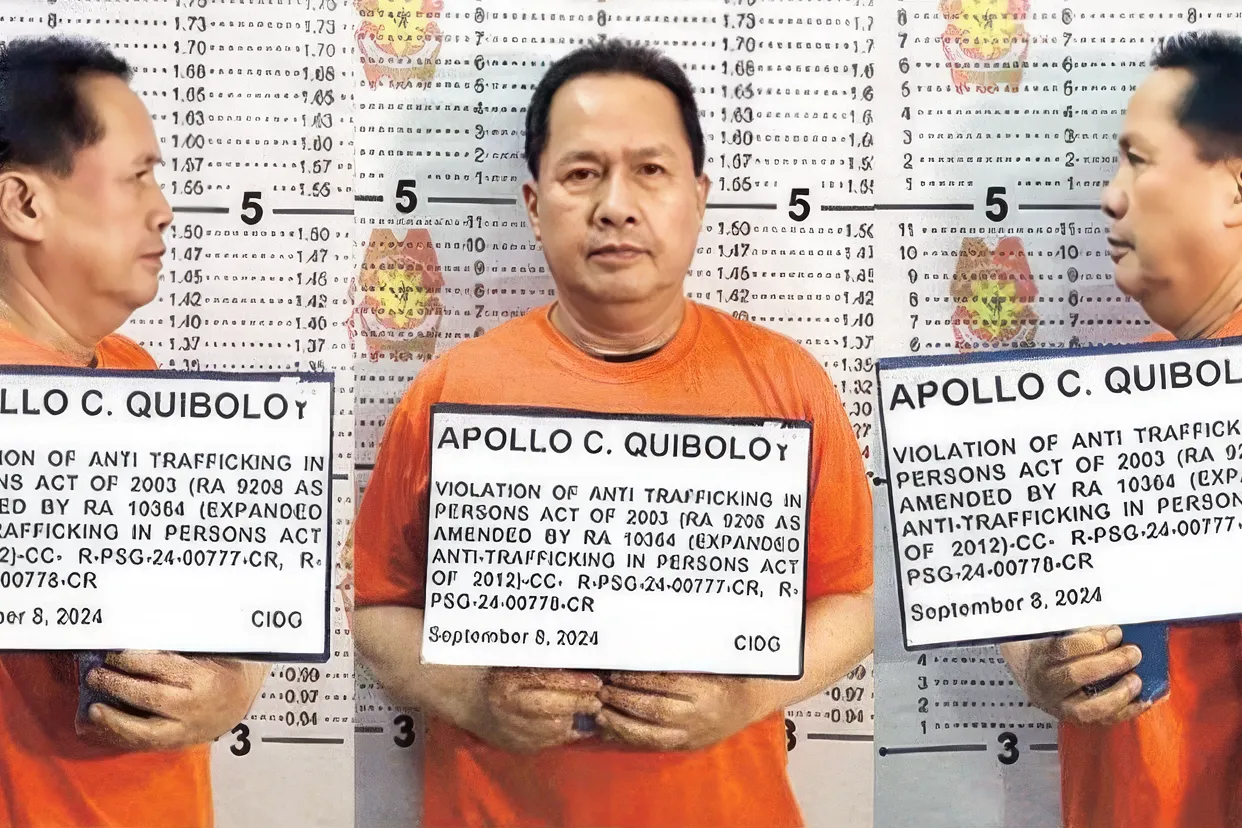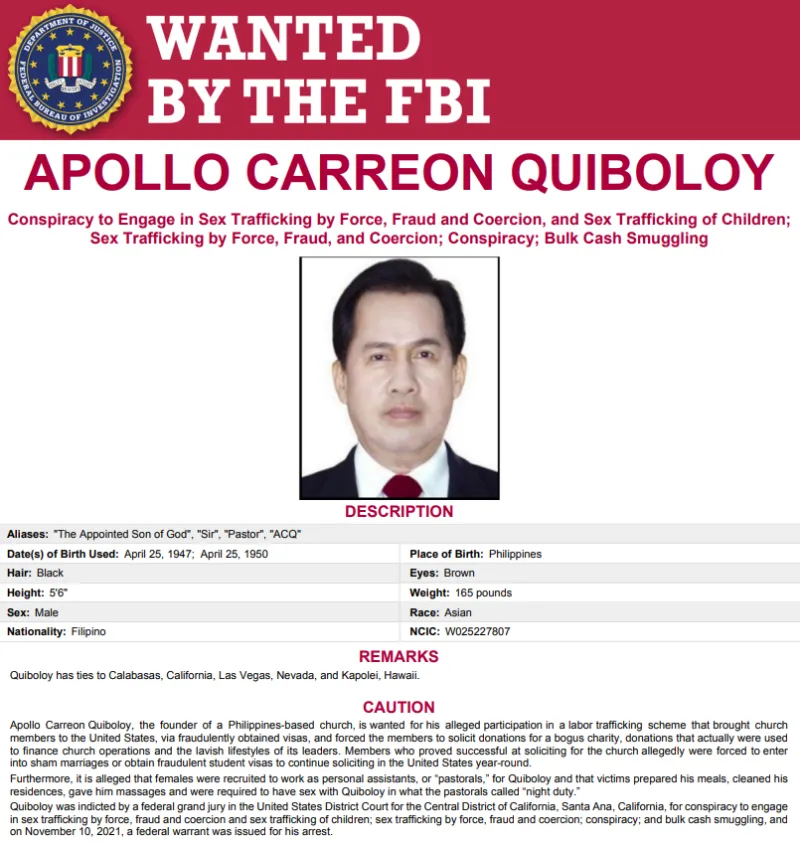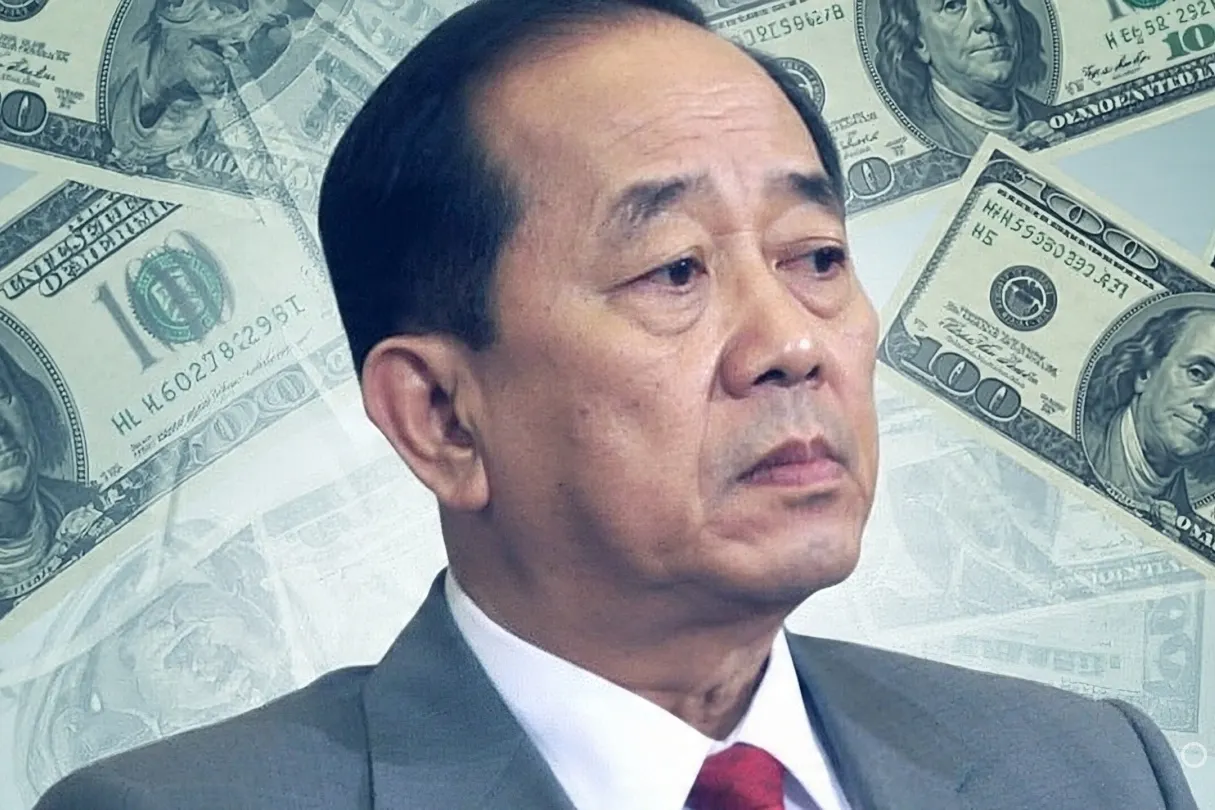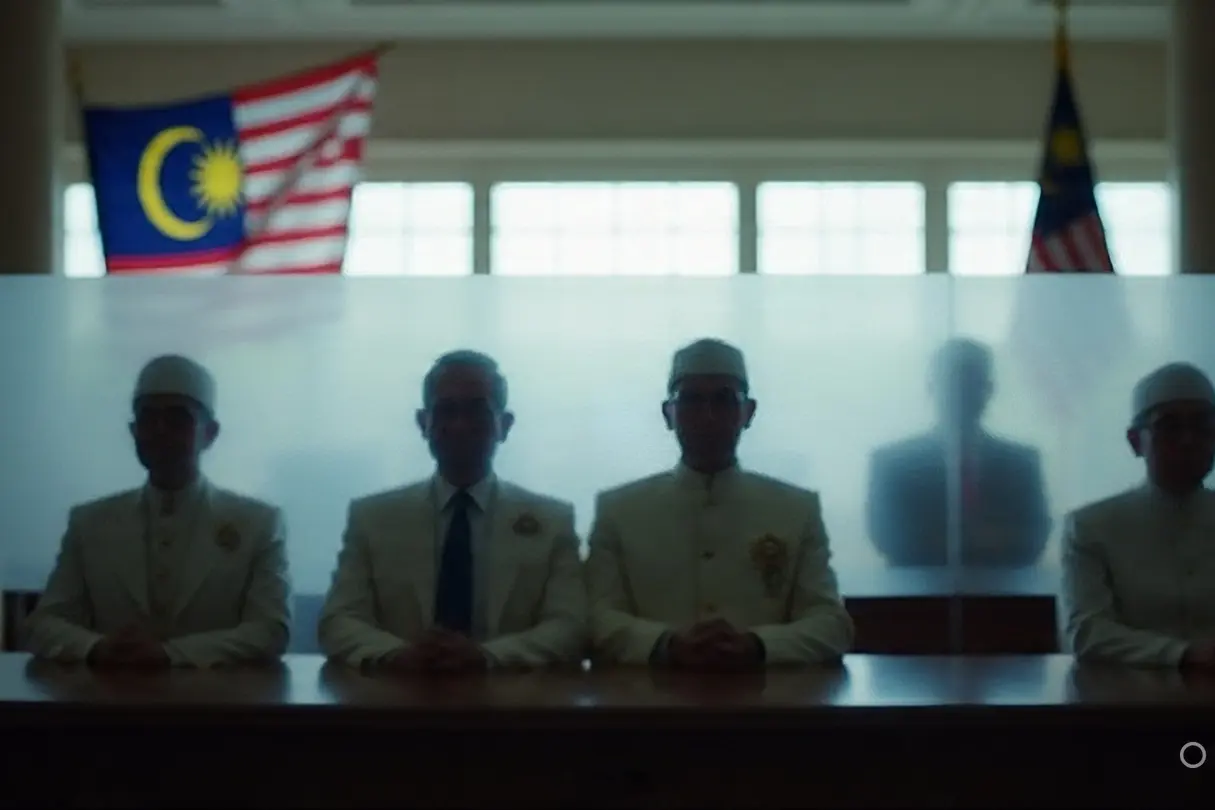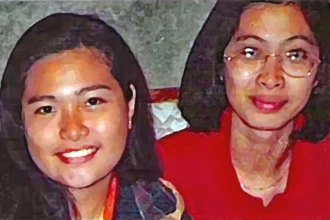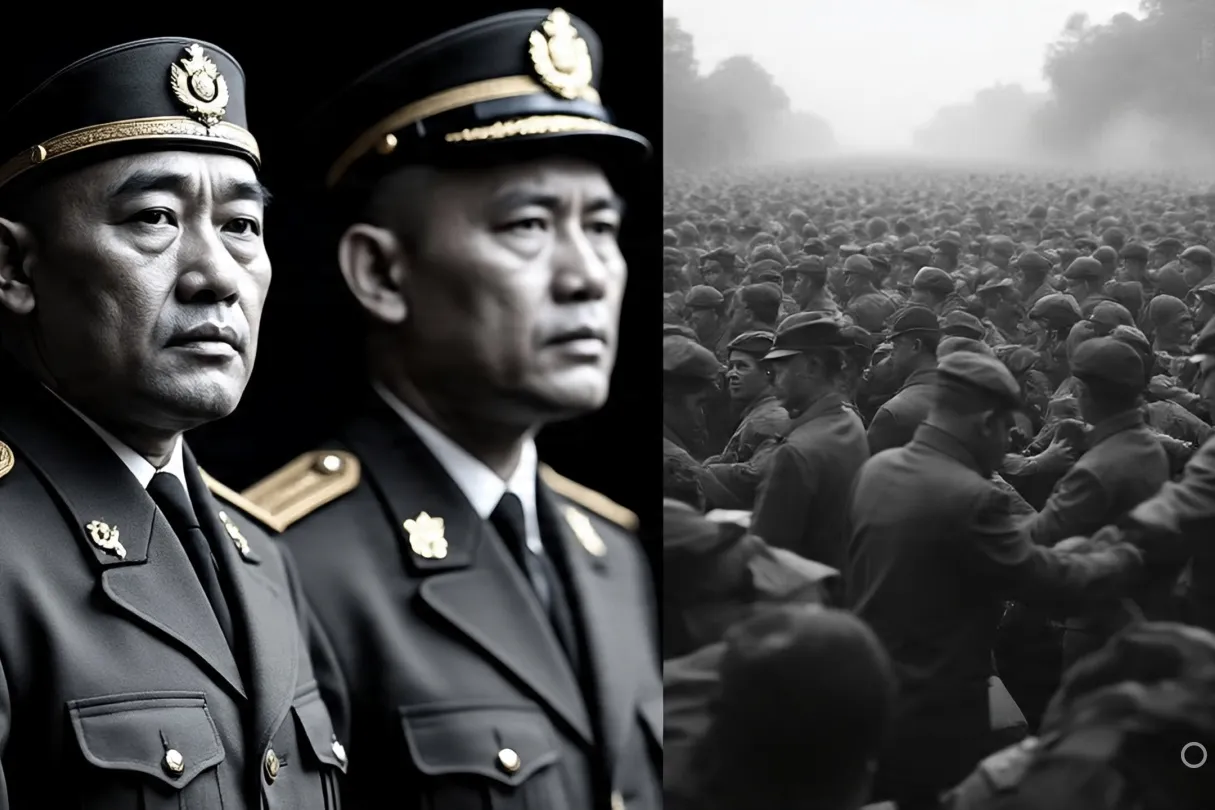In a country where faith is woven into the rhythm of daily life, few figures command as much devotion—or provoke as much controversy—as Apollo Quiboloy. Declaring himself the “Appointed Son of God,” he leads the Kingdom of Jesus Christ (KOJC), a powerful religious movement with millions of followers in the Philippines and beyond. His sermons echo with conviction, his influence stretches across borders, and his empire—both spiritual and financial—continues to grow.
But behind the pulpit lies a darker tale.
Quiboloy now stands accused of crimes that could shatter even the most devout faith: human trafficking, sexual abuse, and forced labor. These aren’t whispered rumors or tabloid headlines—they are formal federal charges filed by U.S. authorities, backed by chilling survivor testimonies and international arrest warrants. Yet despite the gravity of the accusations, Quiboloy remains at large in the Philippines, untouched by the law and shielded, it seems, by a complex web of influence and political protection.
This is more than a scandal. It’s a reflection of the uneasy alliance between religion and politics in the Philippines—a country where spiritual leaders can wield political capital, and legal accountability is often elusive for the powerful.
In this investigative feature, we’ll explore the rise of Apollo Quiboloy, the disturbing claims leveled against him, and the legal, cultural, and political forces that may be enabling his continued freedom. It is a story that asks unsettling questions: Where does faith end and fanaticism begin? How far can divine authority stretch before it breaks the law? And in a system that often bends to influence, who will speak for the victims?
🤝 The Unholy Alliance of Faith and Political Power
Apollo Quiboloy’s immunity from justice is not a matter of divine intervention but a deeply human and political one. For years, he has cultivated close and strategic ties with some of the most powerful figures in the Philippines, most notably former President Rodrigo Duterte. This relationship is not a casual friendship but a public and enduring political alliance that has proven to be mutually beneficial.
The Duterte Connection: A Shield of Political Patronage
Duterte and Quiboloy have openly and frequently supported each other. During Duterte’s presidency, Quiboloy served as a vocal supporter and a key confidant. This cozy relationship was not a secret; it was a visible display of power consolidation. Quiboloy’s influence is a valuable political asset, as his millions of devoted followers represent a solid and organized voting bloc that no ambitious politician can afford to ignore. This support is a currency more powerful than money. In return, Quiboloy has received a form of political protection, a de facto immunity that has shielded him from official scrutiny.
The international warrants for Quiboloy’s arrest, particularly from the U.S. federal government, have been public knowledge for years. Yet, the response from the Philippine government under Duterte was, to critics, deliberately uncooperative. There were no immediate efforts to serve the warrants or to begin extradition proceedings. This reluctance to act, and even the public defense of Quiboloy by the then-president, speaks volumes about the extent of his political protection. It sends a clear message that in the Philippines, certain individuals are considered above the reach of the law if they provide enough political capital.
The Broader Political Web: A System of Immunity
Quiboloy’s power is not dependent on a single political figure but on a system of patronage that he has meticulously built over the years. His political machine is a sophisticated apparatus that extends beyond the presidency. He has openly endorsed and supported numerous political candidates at both the local and national levels, from mayors to senators. This creates a network of political allies who, in turn, feel a sense of obligation to the KOJC and its leader.
During election seasons, this network springs to life. The KOJC’s block voting capacity and its vast media reach through its television and radio networks make it an invaluable tool for any political campaign. In a country where elections can be won or lost by a small margin, the support of a figure like Quiboloy is a game-changer. This transactional relationship ensures that even when a new administration takes power, there are enough allies in key positions to protect him from legal threats. This system of political alliances has effectively insulated him from the justice system, proving that the blending of religious and political power is not an anomaly but a deeply ingrained part of the Philippine political landscape.
The Accusations: A Global Legal Battle
The accusations against Apollo Quiboloy are not based on rumor or political opposition. They are the result of extensive investigations and damning testimonies from former members of his church and are the basis for federal indictments in the United States.
The Nature of the Charges ⚖️
The U.S. federal indictment against Quiboloy and his associates lists a litany of disturbing charges. The core of the accusations center on a criminal enterprise that allegedly exploited members of the KOJC. The key charges include:
- Human Trafficking: The indictment claims that Quiboloy’s organization trafficked young women and girls from the Philippines to the U.S. for forced labor and sexual servitude. These women were allegedly forced to serve Quiboloy, with the understanding that they would be punished by God if they refused.
- Sexual Abuse: Accusations of sexual abuse and coercion are central to the indictment. The indictment claims that Quiboloy allegedly exploited his position of authority to sexually abuse young girls within his church, with these acts framed as “spiritual assignments.”
- Forced Labor: The indictment claims that KOJC members, including children, were allegedly forced to solicit donations for the church in the U.S. and work long hours without pay. The money was allegedly used to fund Quiboloy’s lavish lifestyle and the operations of his organization.
These are not the vague accusations often leveled in political discourse. They are specific, detailed, and backed by a federal grand jury indictment. They paint a picture of a cult-like environment where members were allegedly stripped of their free will and exploited for the personal gain of the leader.
The International Response and Philippine Inertia 🌏
The international legal actions against Quiboloy have been swift and decisive, in stark contrast to the response in his home country. A federal grand jury in California indicted Quiboloy in 2021, leading to the issuance of warrants for his arrest. An Interpol red notice was subsequently issued, effectively making him a wanted man in over 190 countries.
Despite this, the Philippine government’s response has been marked by inertia and a seeming lack of political will. The Department of Justice and other law enforcement agencies have faced public pressure to act on the international warrants, but have consistently cited legal complexities and due process as reasons for the delay. Critics argue that these are little more than stalling tactics, designed to allow Quiboloy to remain free and evade justice.
🛡️ The Anatomy of Impunity: How Power Sanctifies Lawlessness
The Quiboloy saga is a chilling case study of how religion and politics can merge to create a fortress of impunity. In a country where religious devotion is often equated with moral righteousness, Quiboloy’s status as a spiritual leader acts as a powerful defense against both legal action and public opinion.
The Weaponization of Faith 🙏
For his millions of followers, the accusations against Quiboloy are not credible. They are seen as attacks by a hostile world against their “Appointed Son of God.” Any attempt to hold him accountable is framed as religious persecution, a test of their faith. This blind faith creates a powerful human shield, making it politically risky for any government official to act against him. The political weaponization of faith effectively paralyzes the state, forcing it to choose between upholding the law and risking a political and social backlash from a powerful and organized religious bloc.
The loyalty of his followers is a critical element of his power. They are his most potent weapon, and he uses them to project a public image of victimhood. The legal battle is not framed as a criminal case, but as a spiritual war.
The Blending of Church and State ⛪
The Quiboloy case is a symptom of a larger problem in the Philippines: a culture where powerful figures, whether through political connections or immense wealth, are often deemed above the law. In this context, Quiboloy’s immunity is not an anomaly but a tragic example of a deeply entrenched system of injustice.
The Philippines has a long history of powerful religious groups wielding political influence. However, Quiboloy’s case represents a modern, extreme example of this long-standing dynamic. His ability to openly defy international warrants and national law showcases a level of impunity that few other figures could command. This defiance is not just a legal challenge; it is a political statement about the limits of state power in the face of immense spiritual and political influence.
The tragic story of Apollo Quiboloy and his alleged victims forces us to confront uncomfortable truths about power, faith, and accountability in the Philippines. The silence of the government, the unwavering loyalty of his followers, and the fear of political retribution all converge to create a powerful message: that in the Philippines, power can indeed sanctify impunity.
The question for us, as citizens and observers, is not whether Apollo Quiboloy is guilty—that is for a court to decide—but why a court has not been allowed to make that decision. The true scandal is not the existence of the accusations, but the systemic failure to investigate them, a failure that sacrifices the rule of law at the altar of political expediency. We must ask ourselves: what does it say about a democracy when faith can be used as a shield against justice, and how can a nation ever achieve true justice when the powerful can so easily evade its grasp?
